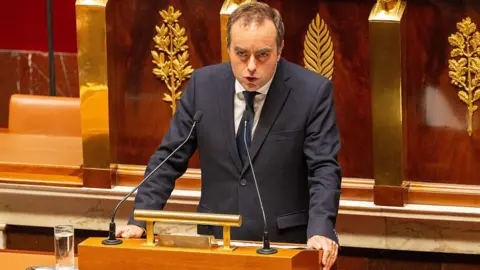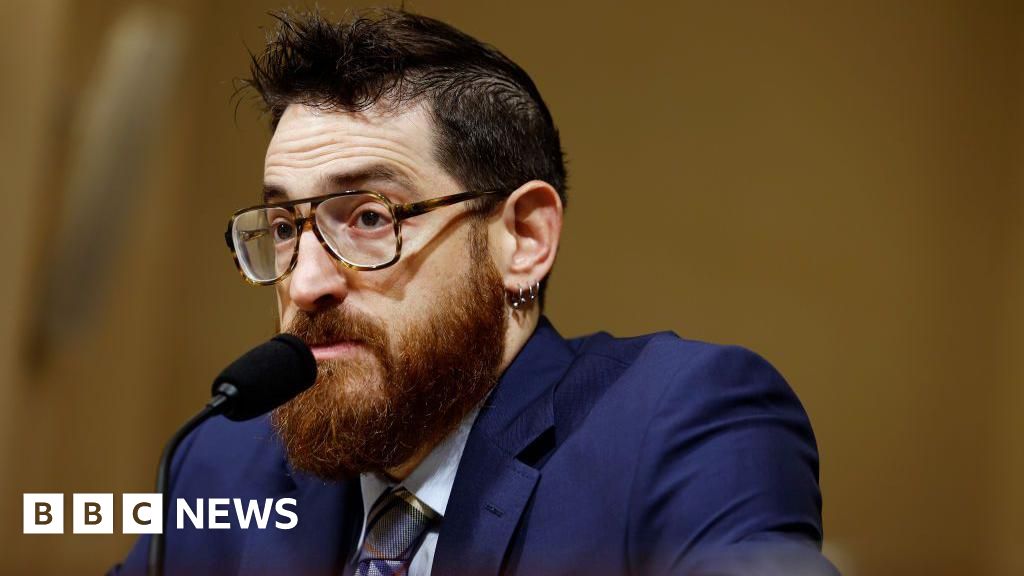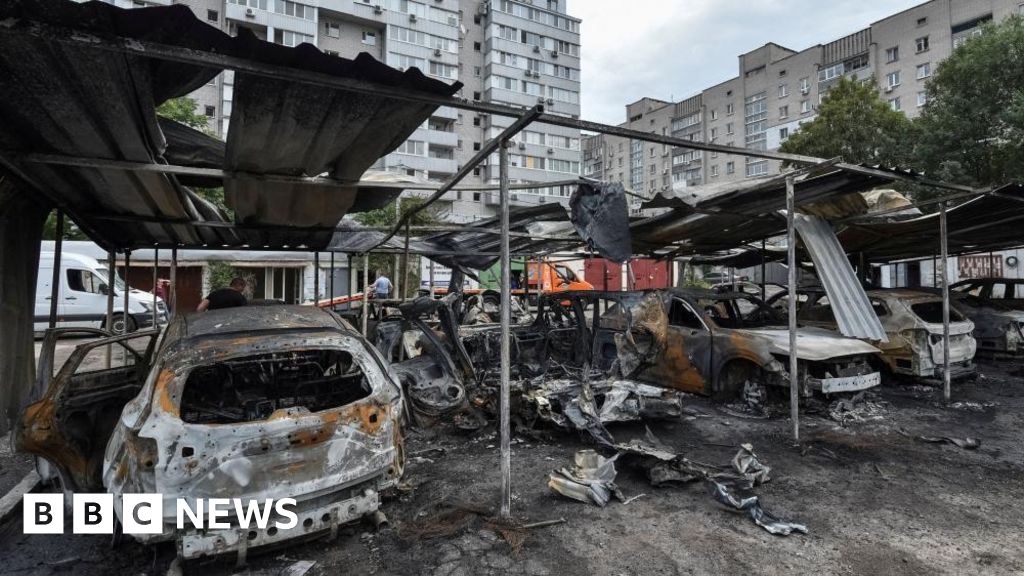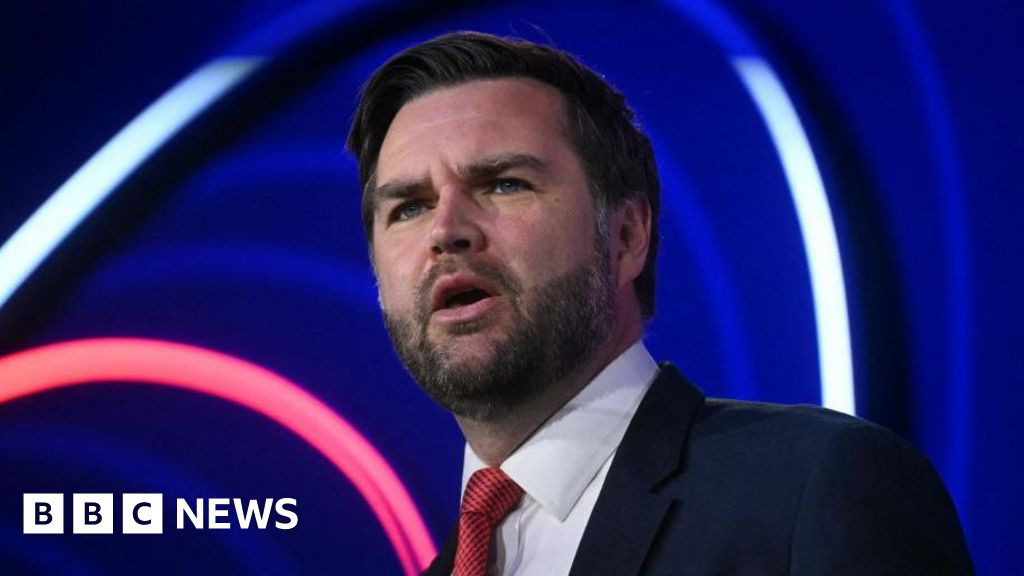Laura Gozzi and
Paul KirbyEurope digital editor
 Bloomberg via Getty Images
Bloomberg via Getty ImagesFrench Prime Minister Sébastien Lecornu has told parliament he backs suspending controversial 2023 pension reforms, in the face of crucial votes of no-confidence later this week.
The changes, which raised the retirement age from 62 to 64, were seen as signature reforms in Emmanuel Macron’s presidency.
“This autumn I will propose to parliament that we suspend the 2023 pension reform until the [2027] presidential election,” Lecornu said to applause from left-wing parties.
Lecornu was reappointed prime minister last week only four days after he resigned, and needs the support of Socialist MPs in parliament if his government is to survive.
Opposition parties on the far right and far left have called confidence votes, known as “censure” votes on Lecornu’s government, for Thursday morning and are demanding parliamentary elections.
The Socialists said they would be prepared to support the new government, but only if it promises a complete suspension of Macron’s pension changes.
“If he does not explicitly say the words ‘immediate and complete suspension of the pension reform’, it will be censure,” Socialist MP Laurent Baumel said earlier on French TV.
“He is holding his destiny in his own hands. He knows what he has do if he doesn’t want to be the prime minister who resigns every week.”
The reforms were finally pushed through parliament in March 2023, less than a year after Macron was voted in for a second presidential term.
There had been months of political debate, strikes and street protests, and in the end the bill had to go through without a vote in parliament using a constitutional mechanism known as 49:3.
Last week, Lecornu said it was something many French people remembered as a “wound on democracy” .
On Tuesday he made it plain to MPs that suspending the pension reform would cost €400m (£350m) in 2026 and a further €1.8bn (£1.57bn) in 2027. This will have to be “compensated by other savings,” Lecornu said.
Lecornu is France’s third prime minister in the past year but even if he does survive he needs to get a budget through parliament that brings down a budget deficit heading for 5.4% of economic output (GDP) this year.
France’s public debt earlier this year stood at €3.4tn, or almost 114% of GDP, the third highest in the eurozone after Greece and Italy.
Lecornu has been one of Macron’s most loyal allies, so his decision to row back on such a contested reform shows how keen the president is to avoid further turmoil.
Philippe Aghion, who was jointly awarded the 2025 Nobel economics prize on Monday, said earlier that he also backed a suspension of the pension reform, because it would still come at a smaller cost than the instability that would follow another government collapse.
“We’re living through an era of crisis,” Lecornu told MPs. “Some people want the situation to turn into a regime crisis, but that won’t happen.”
Promising a “serious and reliable budget”, the prime minister also vowed to bring an end to reliance on the 49:3 mechanism to push through legal changes without a vote. Since late 2022, every budget has had to be forced through without a vote.
Repeatedly, he told the chamber that “the government will propose, we will debate and you will vote”.
Parliament will have “the final word”, he said.
To audible groans from MPs, Lecornu proposed a working group to look into pensions, and said it would have to come to a decision by the time of the next presidential election.
France’s budget deficit is far above the EU target of 3% of GDP, and Lecornu said that reversing the pension reform would have to be “financially compensated, including through cost-saving measures. It cannot be carried out at the expense of an increased deficit”.
Marine Le Pen’s hard-right National Rally and the radical-left France Unbowed (LFI) of Jean-Luc Mélenchon have both tabled confidence votes in Lecornu’s government on Thursday, but would need the support of centre-left parties to bring him down.
Le Pen and Mélenchon believe elections are the only way of ending the political deadlock that came out of snap elections called by Macron in the summer of 2024.
That deadlock turned to turmoil last week when Lecornu resigned as prime minister 26 days after Macron had appointed him, and only hours after he had named his government.
In a week of political twists and drama, Macron then reappointed him late on Friday.
The move was widely seen as a last-ditch attempt by the president to exercise control over an increasingly rudderless National Assembly, which has been splintered into three distinct factions since the 2024 vote.
That hung parliament has resulted in two short-lived prime ministers who were voted down within months when they attempted to put forward their yearly budgets.
Eight days ago, Lecornu stood down before he could even face MPs.




